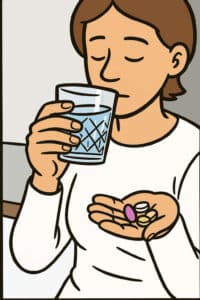The Vitamins and Minerals That Support Energy Indirectly
In the previous blog, we explored the vitamins and minerals that directly participate in ATP production, which is the process

A recent UCSF study in Annals of Neurology looked at “active” B12 in adults over 70—and found that even those with B12 levels sitting at the low end of the official “normal” range processed information more slowly and had more damage to the brain’s communication pathways than individuals with higher levels. In other words, meeting the standard Nutrient Reference Value (NRV) for B12 may not be enough to keep your mind sharp. Doctors are prescribing higher B12 doses—well above the Daily Reference Value (DRV)—to patients who show any sign of mild mental decline.
These two reports share a common theme: dosage matters. It’s not just “take B12 & fish oil”, it’s “how much should I take”. The dosage can determine whether these nutrients get to where they can truly support the brain.
Ask for active B12 test if you’re over 60 and notice mild cognitive changes and/or increase your B12 intake from food or supplementation.
Choose high quality, strong Omega‑3 supplements, at least 1g of Omega 3 per day. The EU approves claims that 250mg of DHA and 250mg EPA aids Vision, Brain and Heart).
Combine nutrient support with healthy habits like regular exercise and vitamin D—from diet or supplement—to support both brain and DNA health.
Monitor your progress, through focus, memory retention, and daily clarity.
Shifting from “normal” to “optimal” nutrient intake levels could be one of the most effective ways to preserve mental performance as we get older.
The days of ‘Little of Everything, Lots of nothing‘ supplementation are over. Focused supplementation in the right dosages is the way forward.
To receive our Newsletter of Research into Vitamins that may help Memory, reduce Tiredness and reduce the chances of Dementia, Alzheimer’s and Cognitive decline please leave your email address below.
In the previous blog, we explored the vitamins and minerals that directly participate in ATP production, which is the process
Feeling tired even after a full night’s sleep? Struggling with afternoon crashes, brain fog, or low stamina during workouts? While
We use cookies to enhance your browsing experience and to analyse our website traffic. We will not share any of your personal details.